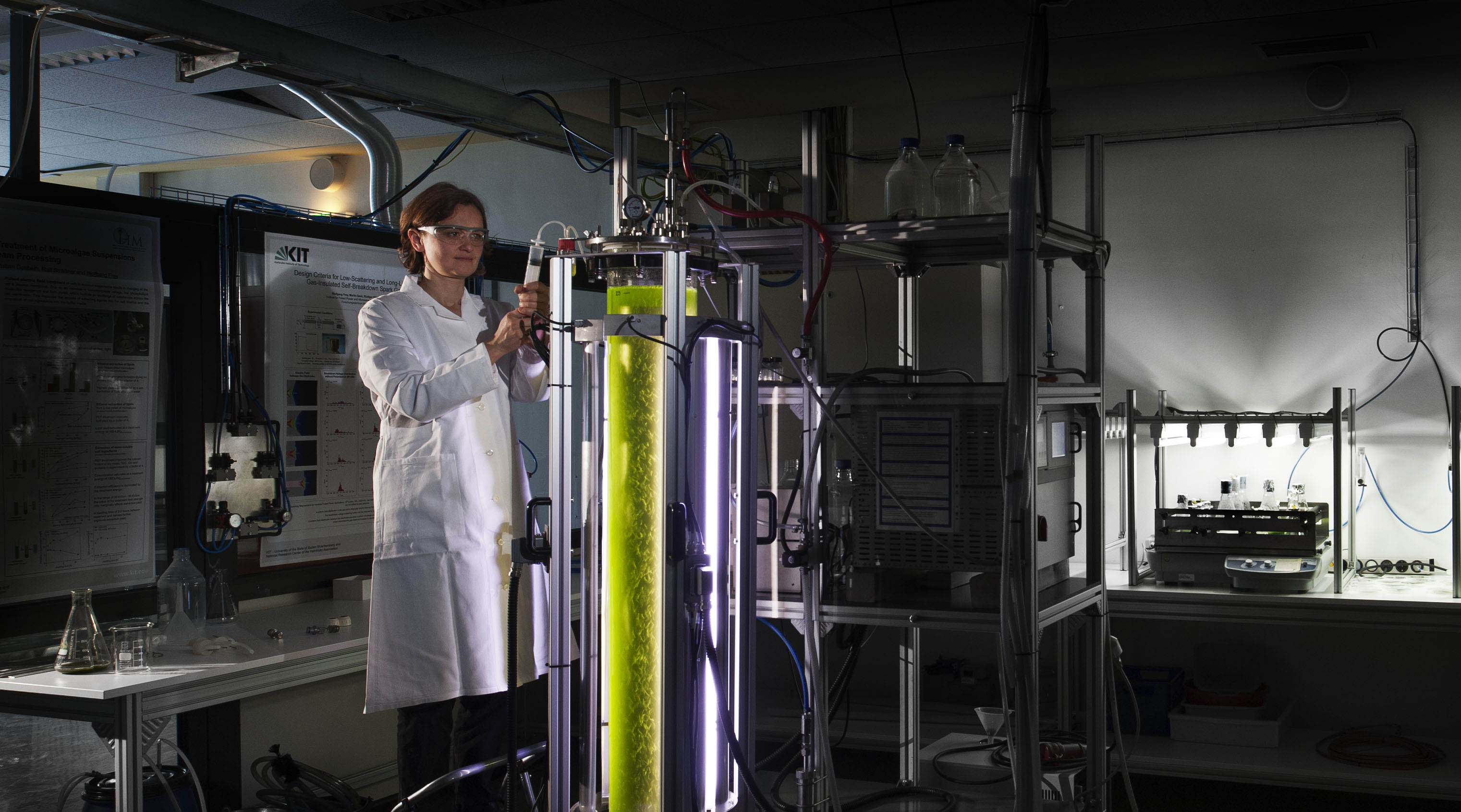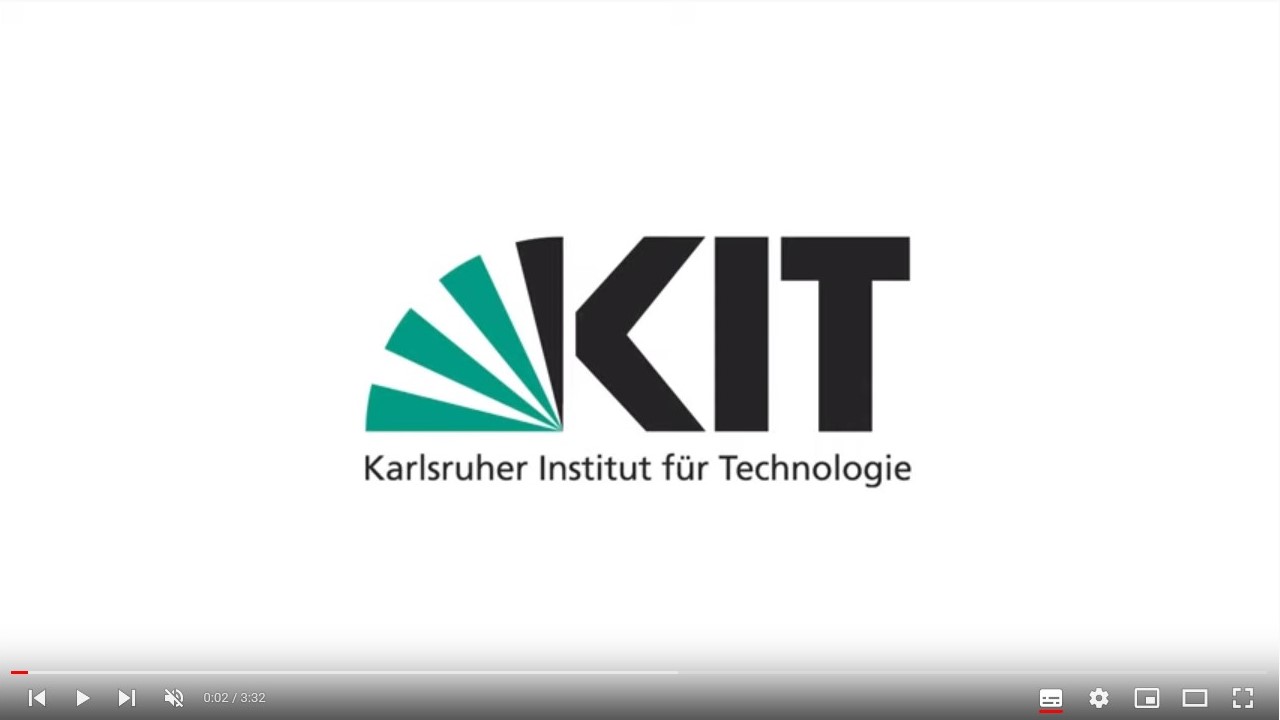Degree: Master of Science (M.Sc.)
Regular program length: 4 semester (full-time program)
Credit points (ECTS): 120 credit points
Language of instruction: German
Higher semester: no
Higher semester: winter and summer term
First semester: September 30 for winter term, March 31 for summer term
Higher semester: September 30 for winter term, March 31 for summer term
First semester: July 15 for winter term, January 15 for summer term
Higher semester: July 15 for winter term, January 15 for summer term
Studiengangsbeschreibung
Studienaufbau
Im Masterstudiengang Bioingenieurwesen vertiefst und erweiterst du die im Bachelorstudium erworbenen Kenntnisse und setzt gleichzeitig eigene fachliche Schwerpunkte. Der Studiengang vermittelt dir in Theorie und Praxis Kenntnisse, die es dir erlauben, verfahrenstechnische Prinzipien auf biologische Stoffsysteme anzuwenden. Dadurch unterscheidet er sich von den naturwissenschaftlichen Studiengängen, der Biotechnologie oder der molekularen Biotechnologie, die vor allem die Nutzbarmachung biologischer Prinzipien behandeln. Das Hauptaugenmerk liegt am KIT auf biotechnologischen Verfahren und Prozessen, die eine industrielle Nutzbarmachung von biologischen Systemen umsetzen. In der Masterarbeit erbringst du den Nachweis, dass du ein fachliches Problem selbstständig und in begrenzter Zeit mit wissenschaftlichen Methoden, die dem Stand der Forschung entsprechen, bearbeiten kannst. Das verpflichtende Berufspraktikum vermittelt dir Einsichten in die berufspraktische Tätigkeit als Ingenieur oder Ingenieurin.
Du absolvierst verpflichtend das Fach Kernkompetenzen (12 Leistungspunkte), bestehend aus Prozess- und Anlagendesign in der Biotechnologie und Thermodynamik im Bioingenieurwesen. Weitere 22 Leistungspunkte sammelst du in den Pflichtfächern
- Verfahrenstechnik (mindestens 6 bis zu 16 Leistungspunkten) und
- Rechnergestützte Methoden (mindestens 6 bis zu 16 Leistungspunkten)
Im Wahlpflichtbereich belegst du Module im Umfang von 40 Leistungspunkten. Überfachliche Qualifikationen komplettieren deinen Studienplan.
Qualification profile of the graduate
The focus of bioengineering is on process engineering in the context of an industrial, engineering-driven application of biological and biotechnological principles. In this way, bioengineering differs from natural sciences programs, biotechnology or molecular biotechnology, which deal primarily with the utilization of biological principles. Bioengineers make a crucial contribution to the development of interdisciplinary approaches for creating an energetically and materially sustainable, post-fossil economy.
The Master's program provides extensive detailed knowledge in engineering, mathematics and natural sciences, which enables graduates to apply process engineering principles to biological material systems. The Master's degree qualifies graduates to work scientifically and act responsibly within their professional activity and in the society.
Based on the Bachelor's program, the compulsory program in the first year focuses on advanced methodical and qualified fundamental knowledge with a main focus on biotechnological procedures and processes that make an industrial utilization of biological systems possible. This knowledge is further advanced within two specialized courses elected by the students. One of these specialized courses has to deal with aspects of biotechnological material systems.
In the scope of the Master's thesis, students prove their ability to work on a problem within their field of expertise independently and in a defined time frame using scientific methods that correspond to the current state of research. In addition, an internship provides insight into the fields of activity of an engineer.
Graduates are qualified to analyze and solve problems using scientific methods and to abstract and formulate complex problems. They are also able to develop new methods, processes and products. Graduates are qualified to combine knowledge from various professional areas and to familiarize themselves systematically with new tasks. They can reflect non-technical impacts of engineering activities and consider those impacts by acting responsibly.
Berufsperspektiven
Aufgrund der zunehmenden Verbreitung biologischer Materialien und Prozesse in Produktentwicklung und Herstellung hast du mit einem Studium des Bioingenieurwesens in vielen Branchen gute Einstiegsmöglichkeiten. Neben den Sparten der 'weißen', 'roten' und 'grünen' Biotechnologie, die die Felder der biologisch-chemischen, medizinisch-pharmazeutischen sowie Agrar- und Lebensmittelindustrie abdecken, gibt es im Bereich Energie und auch im Elektroniksektor weitere mögliche Arbeitsfelder. Bei einem guten Masterabschluss hast du gute Chancen auf eine Promotion mit der Aussicht auf interessante Aufgaben in der Forschung. Wer sich mit einer eigenen Idee selbstständig machen will, findet am KIT ebenfalls Unterstützung.
Besonderheiten des Studiengangs
Besonderheiten Bioingenieurwesen M.Sc. am KIT
-
Eigene Fakultät mit großem Lehrangebot
-
Master-Orientierungsphase
-
Viele Wahlmöglichkeiten
-
Forschungsorientierte Lehre
-
International vernetzt (CLUSTER, CESAER, Eucor…)
-
Unterstützung bei Existenzgründung
-
Unterstützung der Studienorganisation durch die Zentrale Studienberatung und deine Fachstudienberatung
What KIT has to offer
- central campus close to the city forest and right next to the city center
- 24-hour library offering single and group working places
- wide range of inexpensive catering options (dining hall, cafeteria, Koeri and Pizzawerk)
- numerous interdisciplinary offers for personal and professional development, e.g. Lernlabor, Schreiblabor and Perspektivenlabor
- study abroad, e.g. via Erasmus
- excellent university sports facilities with a large selection of sports
- comprehensive cultural offerings with university orchestras, choirs and theater groups
- extensive support for career entry and self-employment
- internationally oriented degree programs and diverse exchange programs
- modern laboratories and practical teaching methods
- Lernraum app
- diverse student initiatives, clubs and opportunities to actively participate in campus life
- stay in touch after graduation via the alumni network
Zugangsvoraussetzungen
Zugangsvoraussetzungen
Voraussetzungen für den Zugang zum Masterstudiengang Bioingenieurwesen sind auf der Basis der aktuellen Zugangssatzung:
- Bachelorabschluss
ein bestandener Bachelorabschluss (oder mindestens gleichwertiger Abschluss) im Studiengang Bioingenieurwesen oder einem Studiengang mit im Wesentlichen gleichem Inhalt an einer Universität, Fachhochschule oder Berufsakademie bzw. Dualen Hochschule oder an einer ausländischen Hochschule. Das Studium muss im Rahmen einer mindestens dreijährigen Regelstudienzeit und mit einer Mindestanzahl von 180 ECTS-Punkten absolviert worden sein. - Mindestkenntnisse und Mindestleistungen in den Bereichen
- Mathematisch-naturwissenschaftliche Grundlagen im Umfang von mindestens 35 Leistungspunkten, davon mindestens 10 Leistungspunkte im Bereich Mathematik
- Ingenieurwissenschaftliche Grundlagen im Umfang von mindestens 15 Leistungspunkten
- Thermodynamik & Transportprozesse im Umfang von mindestens 15 Leistungspunkten, davon mindestens 5 Leistungspunkte im Bereich Transportprozesse
- Verfahrenstechnische Grundlagen im Umfang von mindestens 12 Leistungspunkten
- Biologie und Biotechnologie im Umfang von mindestens 15 Leistungspunkten
Wichtig: Fehlen Mindestleistungen im Umfang von maximal 15 Leistungspunkten, kann eine Zulassung mit der Auflage erfolgen, dass Leistungen innerhalb der ersten drei Semester des Masterstudiengangs nachgeholt werden.
Sprachvoraussetzungen und -nachweise
Für den Masterstudiengang Bioingenieurwesen benötigst du ausreichende Kenntnisse der deutschen Sprache. Deine Deutschkenntnisse müssen mindestens dem Niveau C1 des Gemeinsamen Europäischen Referenzrahmens für Sprachen (GER) entsprechen.
Proof of sufficient German language skills
Your school-leaving certificate is sufficient proof of your German language skills if
- you obtainted it at a German-speaking school in Germany or abroad
- you are a graduate of a bilingual secondary school in Germany or abroad and have passed a bilingual German examination, such as the AbiBac or the Gemischtsprachiges International Baccalaureat (GIB)
- you obtained your degree at a foreign school, but there is another official agreement with the respective country on the recoginition of your school-leaving certificate or language certificate as proof of language proficiency for university studies in Germany
A complete list of foreign school-leaving and language certificates that are recognizes as proof of sufficient German language skills can be found on the webste of the Kultusministerkonferenz (Standing Conference of the Ministers of Education and Cultural Affairs of the Länder in the Federal Republic of Germany).
If you have not obtained your higher education entrance qualification (HZB) at one of the above-mentioned institutions, you must provide a separate language certificate - regardless of your nationality. Only the following are accepted
- the passed „Prüfungsteil Deutsch“ of the Feststellungsprüfung,
- the passed DSH with an overall result DSH-2,
- the passed TestDaF level 4 in all four parts of the examination (reading comprehension, listening comprehension, written expression, oral expression)
- a comparable, recognized certificate of sufficient German language skills
To find our which other recognized certificates can be accepted by KIT as comparable, please contact
- as a German or German-equivalent applicant: Studierendenservice
- as an applicant with non- EU citizenship: International Students Office
Please note:
Language certificates are extremely important application documents that can prevent your enrollment if you do not submit them on time. Therefore, check early on in the application process whether you have the necessary language certificates for your degree program and, if necessary, plan to take one of the language tests mentioned above. The deadline by which you must submit language certificates corresponds to the enrollment deadline stated in your admission offer. In justified cases, you can apply for an extension of this deadline. The extension can be granted until the start of the lecture period at the latest.
Application portal
Application for the 1st semester
Application for a higher semester
Contacts
Student advisor
Student advisory services (ZSB)


Karlsruher Institut für Technologie (KIT)
Zentrale Studienberatung (ZSB)
Engelbert-Arnold-Str. 2
76131 Karlsruhe
Karlsruher Institut für Technologie (KIT)
Studierendenservice
Kaiserstr. 12
76131 Karlsruhe
First point of contact for international applicants
Karlsruher Institut für Technologie (KIT)
International Students Office (IStO)
Adenauerring 2
76131 Karlsruhe
Printed matter
Module handbook
| Titel | Download |
|---|---|
| Module handbook Bioengineering Master | PDF (German) |
| Public view Bioengineering Master in the Campus Management System | Link (German) Link (English) |
Statutes and regulations
| Titel | Stand | Download |
|---|---|---|
| 2024 KIT 029 Satzung für den Zugang zu dem Masterstudiengang Bioingenieurwesen am Karlsruher Institut für Technologie (KIT) | 29.07.2024, veröffentlicht 29.07.2024 |
| Titel | Stand | Download |
|---|---|---|
| 2025 KIT 033 Studien- und Prüfungsordnung des Karlsruher Instituts für Technologie (KIT) für den Masterstudiengang Bioingenieurwesen | 20.05.2025, veröffentlicht 21.05.2025 |
Teaching calendar
WT 2024/25
10-21-2024 to 02-15-2025
ST 2025
04-22-2025 to 08-02-2025
WT 2025/26
10-27-2025 to 02-21-2026
ST 2026
04-20-2026 to 08-01-2026
WT 2026/27
10-26-2026 to 02-20-2027
ST 2027
04-19-2027 to 07-31-2027
WT 2027/28
10-25-2027 to 02-19-2028
ST 2028
04-18-2028 to 07-29-2028
Lectures will not take place:
- From 12-24 to 01-06
- the week after Pentecost
- on all public holidays in the state of Baden-Wuerttemberg





